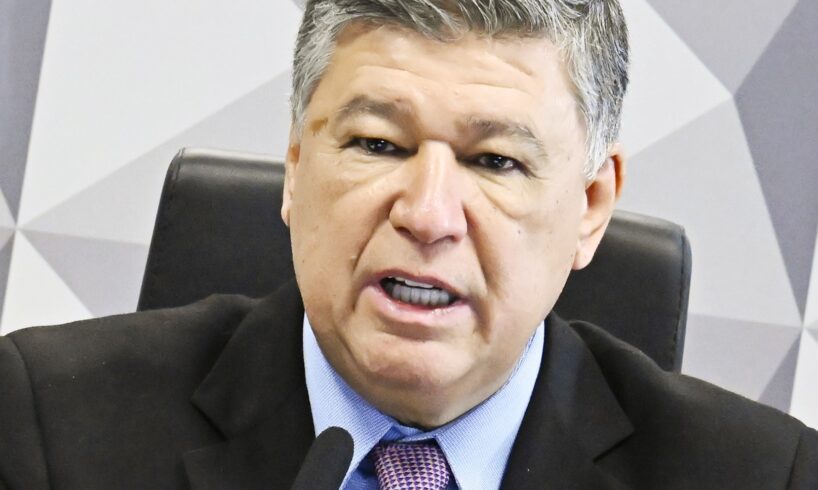
The joint congressional inquiry into fraud at Brazil’s National Social Security Institute (INSS) gained new momentum after the Federal Police (PF) launched the latest phase of Operation No Discount last Thursday (13). The commission will now begin examining politicians suspected of involvement in the scheme. At the same time, attention is expected to shift this week to the launch of a separate Senate-only inquiry into organized crime.
The decision to investigate what committee chair Carlos Viana (Podemos of Minas Gerais) called the scheme’s “political wing” came immediately after the Federal Police operation. Lawmakers believe parliamentarians formed the “top tier” of the fraudulent network. On Thursday, State Deputy Edson Araújo (Brazilian Socialist Party, PSB, Maranhão), one of the Federal Police’s targets, was summoned to testify before the inquiry, which also approved the lifting of his bank and tax secrecy.
“The core of this operation, the operators and those who diverted the money, are already in jail. Now we want to know who helped, who appointed, who nominated, and what they received to keep this scheme running, and how politicians benefited from it,” Mr. Viana said.
Senators expect last week’s raid, which led to the arrest of former INSS president Alessandro Stefanutto to accelerate the inquiry’s work, which had been losing traction. Privately, however, lawmakers doubt the renewed energy will last. They believe that possible links between allied politicians and the INSS fraud could make it harder to pursue the scheme’s “top tier.”
Despite promises of this new investigative phase, Thursday’s session (13) repeated the familiar pattern of recent months: a blame game between government and opposition over which administration enabled the fraud.
After Mr. Stefanutto was placed in preventive detention, opposition lawmakers intensified claims that President Lula’s administration allowed illicit payroll deductions to occur. According to the Federal Police, the former INSS chief collected R$250,000 per month in bribes. His legal team denies all accusations.
“We’ve had the news of the preventive arrest of Alessandro Stefanutto, appointed INSS president by the Lula administration. We also had the preventive arrest of the INSS inspector-general Virgílio Oliveira, also appointed by the Lula administration—precisely when these fraudulent deductions escalated, and the math doesn’t lie,” argued Senator Sergio Moro (Brazil Union of Paraná), a former Justice minister under Jair Bolsonaro.
Government allies in the inquiry have tried to spotlight the role of José Carlos de Oliveira, Mr. Bolsonaro’s former minister of Labor and Pensions, in the fraud—part of an effort to mitigate the political damage caused by Mr. Stefanutto’s arrest. Mr. Oliveira was the target of search and seizure warrants and is now wearing an ankle monitor.
“Bolsonaro’s ministers knew everything as far back as 2019. This criminal ring has been operating for a long time, and now it’s collapsing,” said Workers’ Party (PT) Congressman Rogério Correia (Minas Gerais).
In addition to potential obstacles to continuing its work, the INSS inquiry will now share the spotlight with the Senate’s new organized crime committee, set to begin hearings this week as public security remains one of Brazil’s top concerns.
Senate President Davi Alcolumbre (Brazil Union of Amapá) authorized the creation of the committee after a Rio de Janeiro operation targeting the Red Command (CV) gang left 121 people dead. Before that, even though the inquiry had been announced, it was stalled due to delays in appointments by Senate party blocs.
Hearings are scheduled to begin on Tuesday (18), the same day the lower house is set to vote on the Anti-Gang Bill. The government-backed proposal is being reviewed by Federal Deputy Guilherme Derrite (Progressives Party, PP), who took leave from his post as São Paulo’s Public Security secretary to participate in the legislative debate. On Tuesday (18), the committee is expected to hear from Federal Police Director-General Andrei Rodrigues, a critic of Mr. Derrite’s report who accuses him of trying to weaken the PF.
Lawmakers believe that in the 2026 election year, public security will become a more potent electoral platform than the INSS scandal. Many expect the right to use the new inquiry to damage the government and weaken Lula politically.
“I think this committee will become a battleground of rhetoric, the right saying what it thinks security policy should be, and the left giving its own perspective, arguing that the state cannot be a repressive, violent state,” said Senator Marcos Rogério (Liberal Party, PL, Roraima).
Even so, the leadership of the INSS inquiry does not expect to lose traction to the organized crime committee. They point to the two inquiries’ different audiences and to the smaller number of senators involved in the organized crime probe. While the INSS inquiry is a joint Chamber-Senate commission, the organized crime investigation is Senate-only.
“I’m not concerned about competition because of the number of people who follow our work every day. They are retirees and pensioners, since our inquiry directly affects their lives. The organized crime committee will contribute significantly to legislation against criminal organizations,” Mr. Viana told Valor.
Initially, the government feared that the organized crime inquiry could become an electoral stage for right-wing senators. But the election of PT senator Fabiano Contarato (Espírito Santo) as chair and independent Alessandro Vieira (Brazilian Democratic Movement, MDB, Sergipe) as rapporteur gives Mr. Lula’s allies more control over the agenda.
Lawmakers note, however, that political messaging is inherent to any inquiry and that it would be naïve to ignore the impact that participation in these committees may have on the deputies and senators running for office in 2026. Of the six members who lead the two inquiries, only Senator Hamilton Mourão (Republicans of Rio Grande do Sul) will not be on the ballot.
In the INSS inquiry, Congressman Alfredo Gaspar (Brazil Union of Alagoas) is expected to run for the Senate in Alagoas against political heavyweights Renan Calheiros (Senator, MDB) and Arthur Lira (Federal Deputyt, PP), while Mr. Viana is likely to seek Senate reelection. Similarly, both Messrs. Vieira and Contarato from the organized crime inquiry are expected to run for new Senate terms in their home states.





